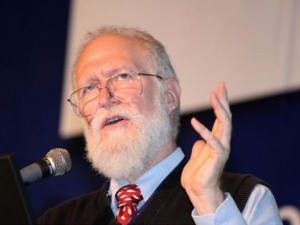Per molti gia´adesso Jon ‘”Maddog” Hall rappresenta il presente e il futuro del software libero. Il 10 aprile sarà in Italia presso l`Open Source System Management Conference. Abbiamo parlato con lui sulle sue visioni del mondo “Open”, cosa veramente li fa trasformare in un “maddog” e come vede il futuro sviluppo della scena Open a livello mondiale e italiana.
Some call you an IT or Open Source legend. Is Open Source in your opinion still combined with an “attitude”, is there an ethical context?
Whenever you have a large group of people involved with any project you are bound to have different styles of presenting a message or messages. Some of these presentations might be perceived of as “attitude”. The first goal of Linux was not necessarily to create a gratis operating system, but one of high quality. An operating system that was not hampered by release cycles determined by new pieces of hardware that had to be delivered, or new products that had to be supported. Software that could be delivered “in its own time”. Examples of this was the push-back by Linus on log-based file systems, and not putting them in until they were ready.
Another goal was to recognize meritocracy…the rising to the top of the best programmers and having them lead the project.
Another goal was to allow collaboration, instead of each participant “re-inventing the wheel”. And of course the goals of the Free Software community is for the end-user to have access to the tools and sources to be able to modify their code far into the future. This is what is promised by the GPL as a license.
Where do you see Open Source heading in the next five to 10 years? What is the difference in the scene when your started in relation to what we see today?
First of all, you need to understand that I have been coding since 1969. When I started coding there were few programs delivered in binary form. There was no copyright of software nor software patents. People wrote code under contract law, and typically if you paid for the code to be written, you owned the code. There were also user groups, bulletin boards, and such that freely shared source code. We did not call this “Open Source” or “Free Software”….we just called it “software”. But CP/M, Apple and Microsoft changed all of that for most people.
Not for me, since I always worked for companies large enough to demand source code from their vendors, schools that got source code for research (or wrote their own), companies that wrote their own code or software vendors. So I did not really use “closed source” code, although I had customers that did. When working for Digital Equipment Corporation I often had to get them access to source code from our binary products. Then I met Linus in May of 1994 and saw that Linux (and GNU/Linux) was going to be of great value to commercial enterprises.
Does proprietary software really turn you into a “maddog”?
I am different than a lot of other “Open Source” people. I do not spit on people that use proprietary software, nor do I spit on people that write it (unless of course they break the law or use unfair business practices). However I tell people why using Free Software is good for them, their educational facilities and their government, and lament when they do not make the change.I find it interesting that despite “Vista”, the de-commissioning of Windows XP, the issues with privacy and security (ala NSA) with proprietary software, that people are not flocking to FOSS by the droves, but we are slowly winning.
Apart from licensing: What are the 3 main advantages of Open Source ?
Control of your software, which allows control of your business. Otherwise you are a software slave, beholding to the “master” software company that controls your lifeblood. The transfer of license royalties that typically travel outside your country to funding local programmers to make changes to the software, which creates local jobs that then funnel local money back into the local economy. Security, privacy, longevity – but these go back to “control”.
What about the Italian IT and Open Source scene. Anyone you know? Anything that comes to mind for you?
Not really. And that is probably a problem. but now that Francis is the Pope, I have some hope.
What about your session at our conference. What well to focus on?
My keynote will be focusing on how Free and Open Source Software has been fundamental in the computer science community in general and in System Management software in particular.







